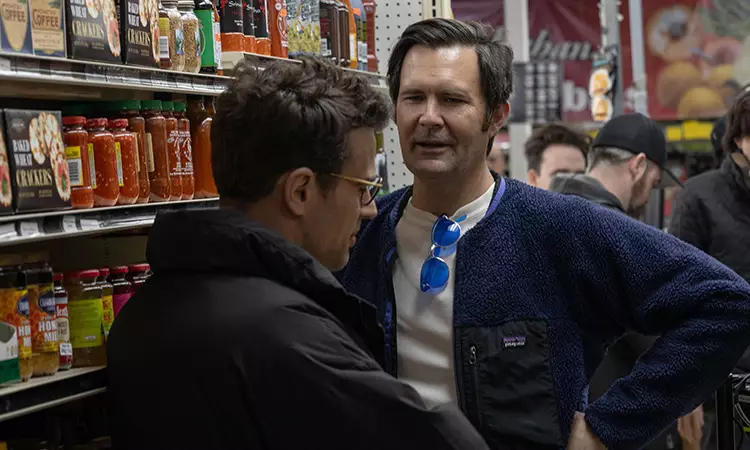In the realm of horror cinema, the intersection of trauma, humor, and nostalgia can produce some of the most thought-provoking narratives. Osgood Perkins has stepped into this space with “Longlegs,” a film that not only draws from a short story by Stephen King but also infuses its unique essence, creating a darkly comedic experience. Starring Theo James in a dual role, the film revolves around twin brothers and their chaotic lives affected by a sinister organ grinder monkey. While the premise might seem fantastical, Perkins and James’s collaboration brings forth a visceral examination of how childhood traumas can echo into adulthood, allowing audiences to explore trauma through a lens of dark humor.
At the heart of “Longlegs” lies a profound conversation about legacy—a theme that Perkins and James pondered deeply during its creation. The coexistence of humor and existential dread underscores the narrative. The monkey serves as a metaphor for the burdens we carry from our past—an ‘existential monkey on one’s back’ that symbolizes the lasting impact of trauma on personal identity. James highlights the necessity of grounding the absurdity with emotional truth, which opened up a pathway for both performers and viewers to engage with the story on a deeper level. By choosing to explore the duality of pain and humor, the film transcends mere entertainment, elevating it into an exploration of the human condition.
Perkins’s intention in creating “Longlegs” was not simply to produce a horror-comedy experience; it was about channeling his personal experiences into storytelling. He emphasizes that every narrative he crafts incorporates elements from his life—an exercise in reflection and self-exploration. The dual nature of the twin brothers, Bill and Hal, serves as an allegory for Perkins’s own journey through loss and the different directions it can guide individuals. By embodying both siblings, Perkins effectively internalizes and externalizes his own complexities, unraveling the layers of trauma and how they manifest in varying ways. This representation of a fractured identity is deeply resonant and invites viewers to consider their own experiences through the lens of the characters’ struggles.
Another critical layer in “Longlegs” is its commentary on masculinity—specifically, toxic masculinity and the regression that stems from unaddressed trauma. Through characters like Bill, who is caught in a nostalgic childlike state, the film critiques the societal pressures that encourage men to remain emotionally stunted. James articulately points out that the fear of growing up leads to anger and violence, drawing parallels to real-world issues of male behavior. The film dares to ask, how many men navigate life as scared boys beneath their tough exteriors? The portrayal of these vulnerable yet flawed male characters allows for an engaging dialogue on masculinity, pushing audiences to confront their preconceptions and societal norms.
From a stylistic perspective, Perkins faced the challenge of balancing modern storytelling with the nostalgic feel of a Stephen King-inspired universe. He navigated this creatively by placing the narrative away from the common clichés associated with classic horror, steering clear of conventional elements like jump scares. Instead, Perkins delights in comedy, surrealism, and the absurd, which underscores the film’s heart. The decision to set the film in the 1980s not only aligns with King’s oeuvre but enriches the visual aesthetics to evoke a sense of nostalgia that resonates with multiple generations. By avoiding a direct replication of King’s style, Perkins honors the essence of King’s work while forging a distinct identity for “Longlegs.”
Perhaps the most significant underlying theme in “Longlegs” is the reverence shown towards Stephen King. Perkins acknowledges King’s monumental contribution to American literature and aims to encapsulate the feeling of wonder and fear that King’s stories often evoke. The endeavor to honor such a towering figure is ambitious, but Perkins seems committed to creating a film that balances respect for the source material with innovative storytelling. By crafting a narrative that feels both personal and sprawling, “Longlegs” becomes not merely an adaptation but a native son of King’s literary universe, hoping to contribute a new voice to the ongoing conversation about trauma, masculinity, and the convoluted interplay between fear and humor.

